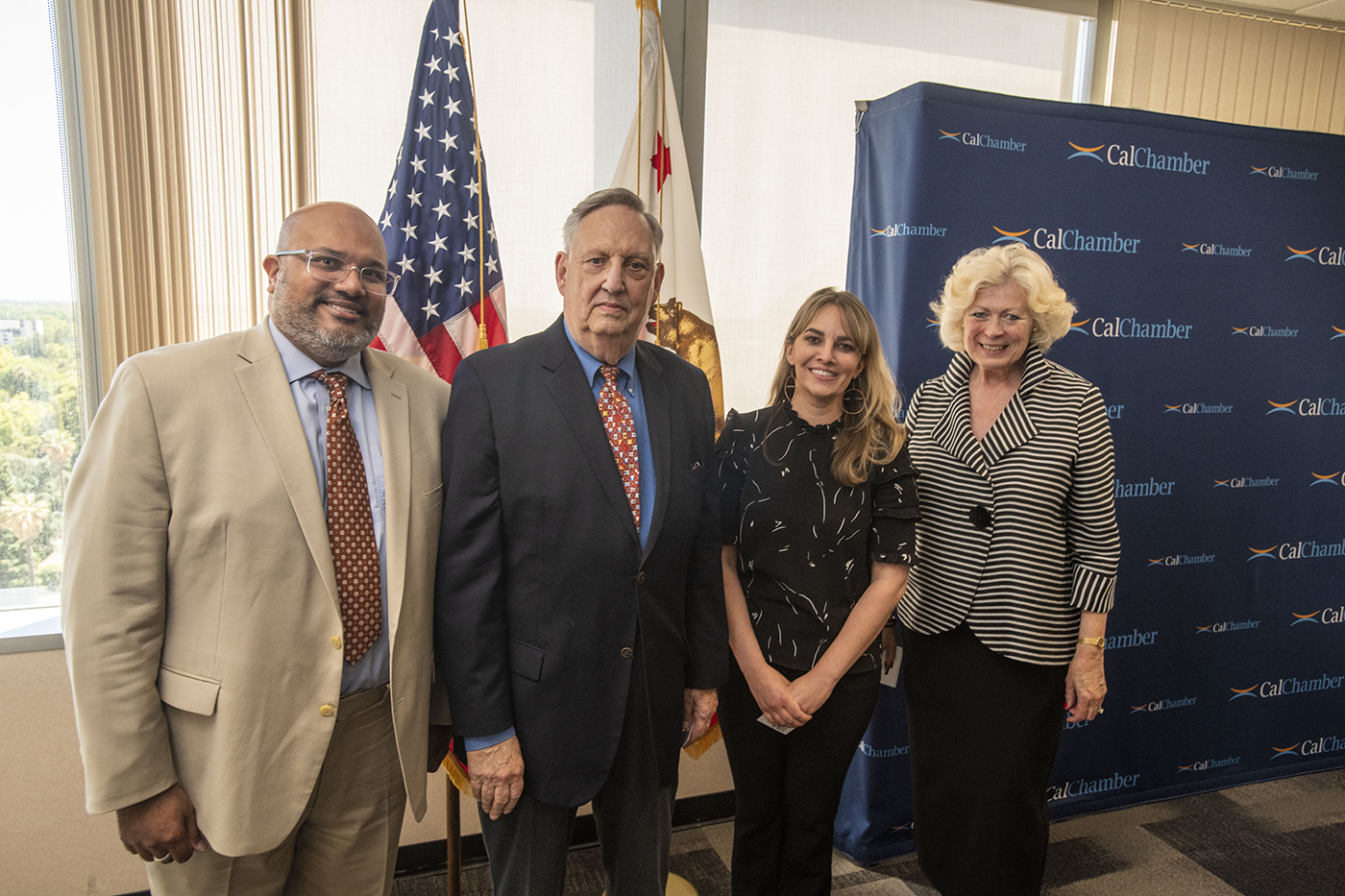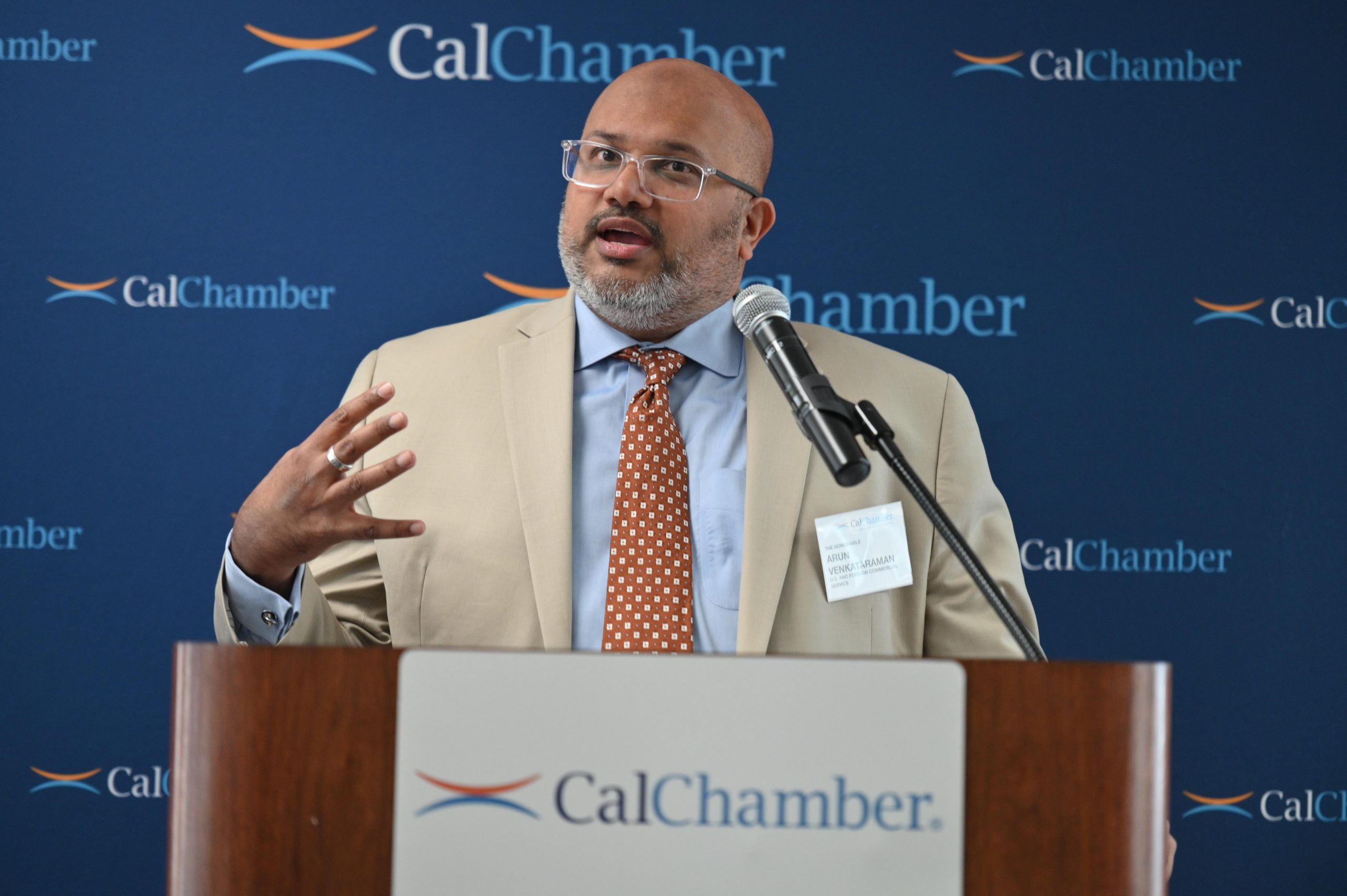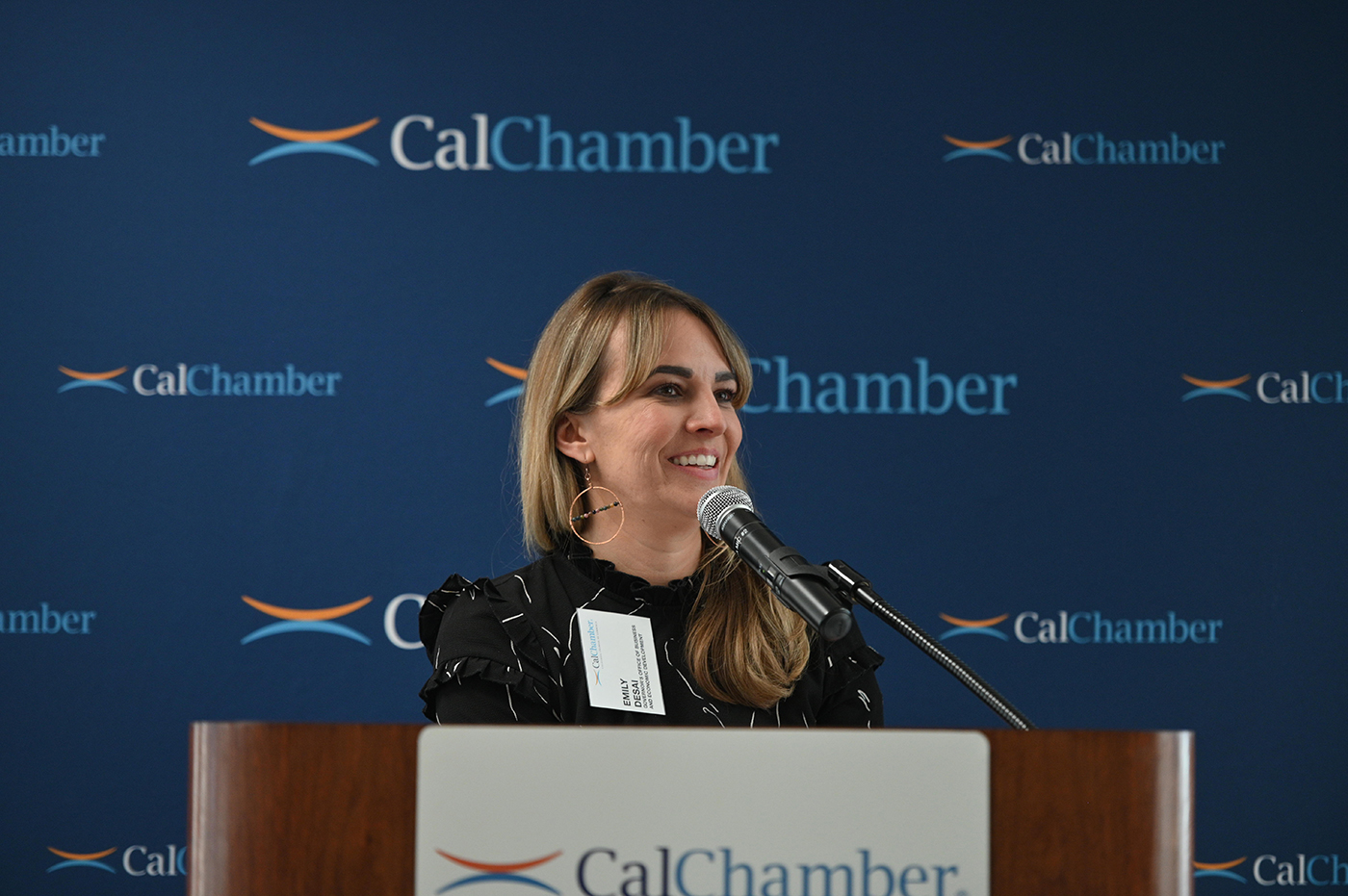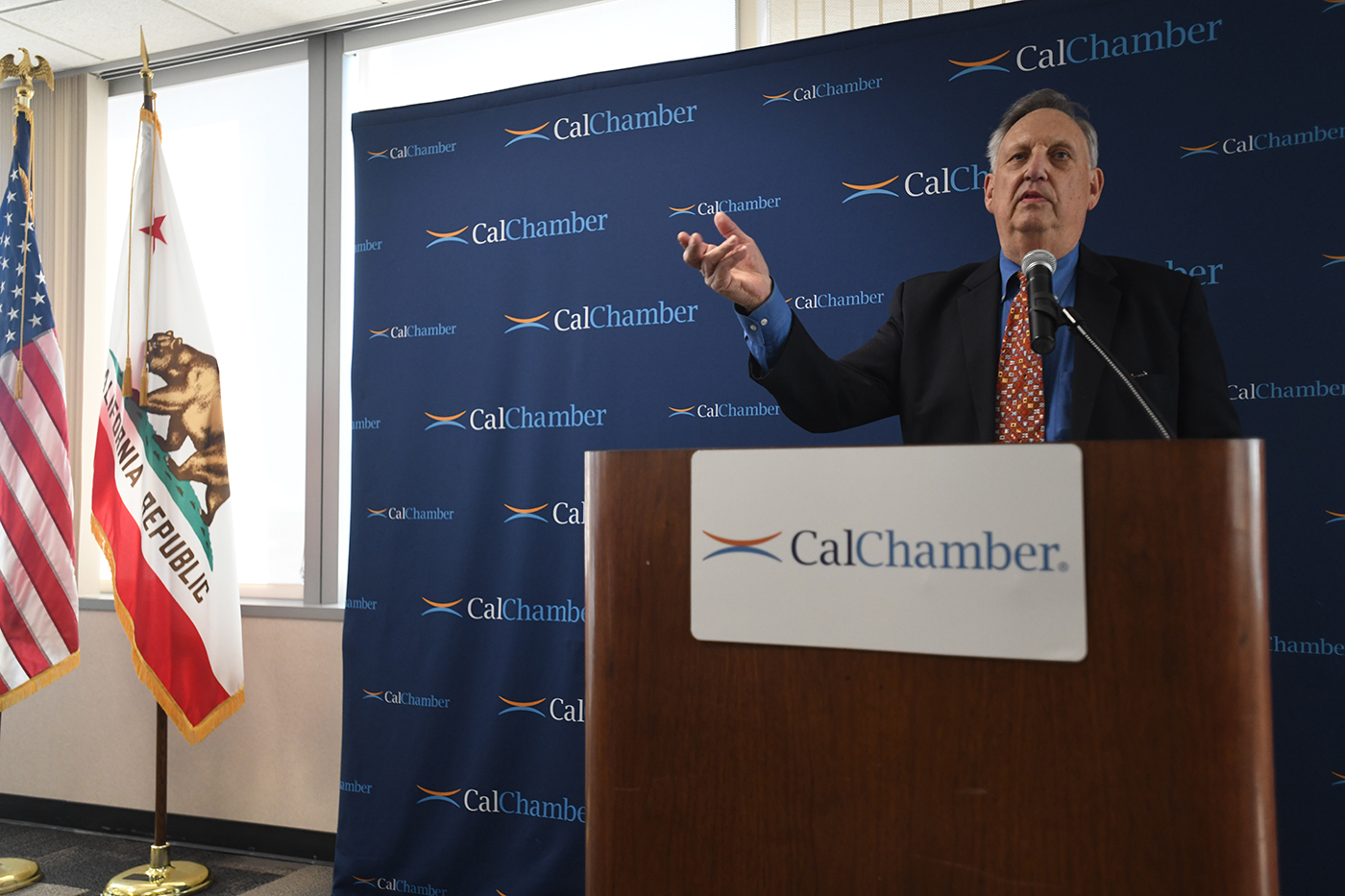
Common challenges facing the global community were the focus of an enthusiastic audience at the California Chamber of Commerce-hosted in-person International Forum last week.
Speaking to the 175 attendees at the June 1 forum were:
• Arun Venkataraman, assistant secretary of commerce for global markets and director general at the U.S. Department of Commerce;
• Emily Desai, deputy director for international affairs and trade at the Governor’s Office of Business and Economic Development (GO-Biz);
• Dan Walters, longtime political columnist, CalMatters,
Susanne T. Stirling, CalChamber vice president, international affairs, moderated the forum.

Director General Venkataraman
Venkataraman highlighted what the Biden-Harris administration has been doing to promote the competitiveness of American businesses and build on bilateral trade relations.
Given the global nature of the challenges facing the international community, he said, it follows that partnership and commitment from all parties, especially representatives of foreign governments, is needed to solve issues ranging from supply chains to excess capacity in certain industries, cyberthreats or the climate crisis.

The pandemic disruption, he noted, exposed the vulnerabilities in the supply chain and highlighted the importance of resilience and the need for the government to focus on transparency.
Two affiliations the administration is using to resolve supply chain issues, he said, are the U.S.-European Union Trade and Technology Council launched last year and the Indo-Pacific Economic Framework started with 12 countries in late May. Later this year, the U.S. Commerce Secretary and Secretary of State will co-host a supply chain ministerial forum to expand cooperation with partner nations.
Director General Venkataraman is leading a team that is moving forward with the administration effort to expand trade opportunities for businesses from underserved communities.
The United States, with its diverse population, is uniquely positioned to harness the talent available, Venkataraman said. America has a duty to ensure that trade benefits everyone, he declared.
Studies show, he pointed out, that racial and gender diversity improve a company’s bottom line.
As part of its commitment to supporting the President’s climate change priorities, the Commerce Department is helping clean technology companies develop export competitiveness. The program will help combat climate change globally while creating good jobs at home, Venkataraman explained.
GO-Biz Trade Team
Desai described the three pillars of the GO-Biz international trade program:
• Attract foreign direct investment (FDI) to the state to grow California jobs.
• Support small businesses so they can enter new global markets.
• Engage in sub-national diplomacy.

Recognizing that California is the No. 1 state for jobs supported by FDI, GO-Biz arranged more than 20 virtual gatherings to highlight opportunities for businesses in advanced technology and biotechnology, Desai said.
A “Meet California” breakfast attracted hundreds of businesses to learn about the state’s “talent pipeline” from the Chancellor of the Community Colleges and executives of innovative firms.
“Companies are excited about doing business in our state because they know that California is the place that turns innovation into commercialization,” Desai said.
Using funding from the U.S. Small Business Administration, GO-Biz has set up virtual trade missions with nations around the world, Desai said. In 2021, the virtual trade missions provided sales leads for Spain, Portugal, Australia, Singapore, Mexico, the United Arab Emirates and Saudi Arabia. So far in 2022, the virtual missions have explored opportunities in Romania and China.
Expansions that can occur if the Governor’s budget request is approved, she said, include enhancing cross-border economic development with Mexico and scaling up the state’s export training network.
The third pillar of the GO-Biz international affairs program, Desai explained, has including signing or renewing of memorandums of understanding (MOU) with partners such as China and Japan; furthering relations with long-term partners; hosting visits — such as the Crown Prince of Norway and New Zealand Prime Minister; and helping the international network deploy access to vaccinations.
“Every one of your teams is an extension of ours,” Desai told the audience. The cooperation of these teams, she commented, helps California on a global stage.
California Politics
Walters described how the California economy has evolved from one based on resources before World War II to the “industrial juggernaut” that produced the implements of war to the logistics (Southern California) and technology centers (Northern California/Silicon Valley) of today.

What could prevent California from continued economic expansion, he said, are shortages of needed goods, services and resources. The challenges, he explained are inter-related and political to one degree or another.
• Water. Supplies have been getting shorter and shorter for several reasons, including climate change — which means the federal and state systems that depend on snowmelt for the water they supply to customers during dry spells don’t have enough water.
Agriculture, which consumes about 75% of developed water, has been cut down to 0% of its allocation.
Walters pointed out that California has not done what it needs to do despite warnings of drought to assure an adequate water supply. He commented that the California Coastal Commission recently rejected a proposal for a desalination plant in Southern California.
• Electrical energy. The water shortage, Walters explained, has led to an energy shortage because so much of the state’s electricity comes from hydropower.
In the transition to noncarbon energy, he commented, California hasn’t maintained reserves as it should. In an effort to ensure adequate electricity supplies, the state is keeping gas-powered plants online beyond their originally planned retirement date and the Governor has announced wanting to keep the Diablo Canyon nuclear plant operating as well, Walters observed.
California, he said has shown a “lack of political will” to do what’s necessary “to make sure we’ll have power when the wind doesn’t blow and the sun doesn’t shine.”
• Housing. Walters commented that there is a housing crunch nationwide, but the shortage is particularly severe in California, which needs about 180,000 new units annually to keep up with demand and tackle the supply backlog, yet has been producing about half that amount.
Lack of housing, he said, is a major contributor to California having the highest poverty rate, as measured by the Census Bureau, and contributes to the “very visible homelessness” on the streets of Sacramento and other cities around the state.
The shortage makes it difficult for companies to hire workers because those employees can’t afford to live here, he said. The median price of a home in California today is $800,000, versus $200,000 in most states.
The lack of affordable housing has a corrosive impact on the economy and prevents the state from having the labor needed for a vibrant economy, Walters said, noting that California has been losing population for the last couple of years.
• Labor. Up and down the state, companies report having difficulty finding workers, Walters said. Just a few examples include fast food restaurants offering $18 per hour but still being unable to find workers. Truck drivers, teachers, police and fire fighters are other categories of workers in short supply.
The shortages listed, Walters commented, are potential drags on the California economy, and are “all political issues to one degree or another.”
He closed by warning that Californians need to remember that “nothing should be taken for granted.”
A vibrant, growing and prosperous society, he said, depends on having the right quantities of the right resources.
“If we continue to ignore some of these fundamentals…eventually we will pay the price — just as Detroit did, just as the Roman Empire did.”

